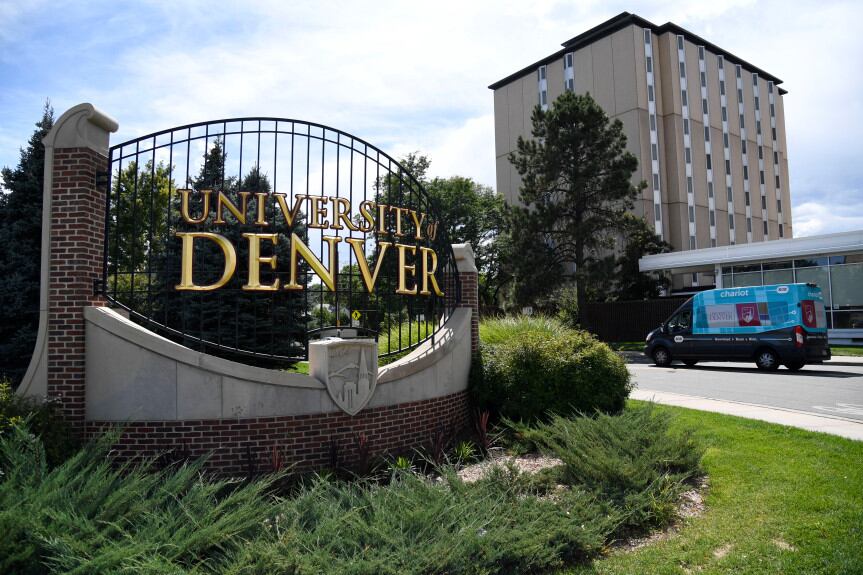Denver public health officials enacted stricter rules for area colleges and their students on Thursday after a series of outbreaks at three of the city’s universities.
The health department will require colleges to conduct daily health screenings, increase efforts to ensure mask compliance, limit campus visitors, and submit a compliance plan to health officials. Schools will also need to enforce punishment for noncompliance.
The stricter rules underscore the hazard of students returning to colleges and getting into the swing of campus life.
Denver’s decision comes as outbreaks at the University of Colorado Boulder are threatening in-person learning, and Colorado College has moved fully remote. Meanwhile, universities around the country are also grappling with clusters of cases traced to rulebreaking on campuses and in student communities.
“I know the gatherings that usually happen at the beginning of a new school year and other campus activities are an important part of college life,” Denver Mayor Michael Hancock said. “I can tell you, I for one truly enjoyed it when I was a student and on campus. But we have got to recognize that this is different, this year is different. Students have to take these public health measures seriously.”
While most students are complying with health orders, Denver Department of Public Health and Environment Executive Director Robert McDonald said outbreaks can get out of hand quickly. He hopes the order will head off other outbreaks.
A college student epidemic potentially can affect the greater Denver community. And while recent cases haven’t affected Denver Public Schools’ plans to bring students back to the classroom, Hancock said the city is working closely with the district to monitor the situation.
McDonald said students must be aware that their actions can have wide-ranging consequences.
“I think it’s important for young adults to understand that while you might be able to handle this virus a little bit better than our most vulnerable people, you can still transmit it,” Hancock said.
The state is seeing an increasing number of cases among college-age students. This week, the Colorado Department of Public Health and Environment reported 10 active outbreaks linked to higher education institutions, including at Regis University, Metro State University of Denver, and the University of Denver — which alone had eight outbreaks.
The order also requires schools to notify the Denver health department within 24 hours of confirmed cases and requires all student-athletes, coaches, athletic trainers, medical personnel, and anyone attending indoor and outdoor athletic activities to wear face coverings, including during practices and games.
Schools will have until Wednesday to complete compliance plans and must detail how they will deploy campus security, campus police, and other resources to enforce the order.
The city could crack down further, issuing quarantine and isolation orders, requiring virtual classes, and confining students at home.
Denver’s decision comes on the same day that Boulder County health officials cracked down on student activity.
On Wednesday, the University of Colorado Boulder shifted to remote instruction for two weeks because of sustained outbreaks there. The tally of outbreaks increased to over 1,200 since the return of students in late August.
Thursday morning Boulder County prohibited gatherings of any size of anyone from ages 18 to 22. The county also issued stay-at-home orders to residents at certain addresses on University Hill, a dense student residential area.
The university may reopen classrooms Oct. 17, but have not committed to that date. For now, undergraduate and graduate classes, including labs, studio, and performance classes, are taught remotely, unless those classes have been approved to meet in person.
The university also has asked students to stay home. Those disobeying public health orders may receive an immediate 10-day suspension.
COVID-19 cases have surged elsewhere as students returned to college campuses.
A recent study by several universities and the College Crisis Initiative at Davidson College shows openings have caused thousands of new cases in counties with colleges.
Indiana University Professor Kosali Simon, a researcher on the study, said it appears the coronavirus has spread not in classes, but instead at gatherings on and off campus.
In response to outbreaks, colleges have gone remote or taken two-week breaks from in-person instruction.
She said colleges are taking appropriate responses to limit the spread of the virus. At the same time, the surge in cases highlights how little power college administrators have in controlling student populations.
“No one can quite predict what young people are going to do, how they’re going to behave, and what’s going to be effective at controlling their behavior and influencing their behavior,” Simon said.
Despite the rise in cases across Denver, Denver Public Schools said it is on track in its plans to gradually reopen.
The district created a dashboard that tracks three metrics: the number of COVID-19 cases per 100,000 people in Denver over the past 14 days, the rate of increase or decrease, and the percentage of COVID tests that come back positive. Warning signs have flashed as college student cases have grown.
But public health officials are advising that so far, the college surge shouldn’t cancel plans to reopen K-12 schools. Local public health officials issued a letter to Denver schools Superintendent Susana Cordova saying they presume college students “will have little, if any, contact with grade-school children.”







